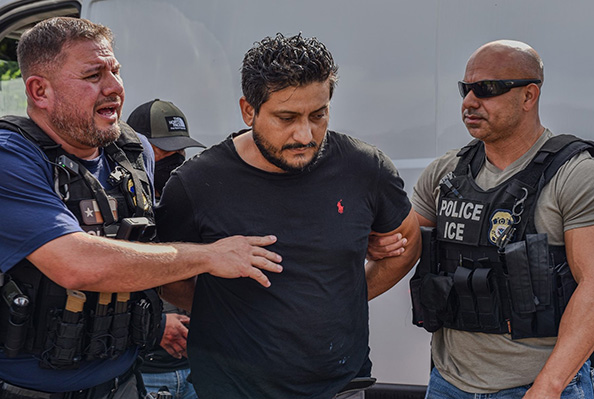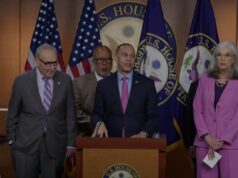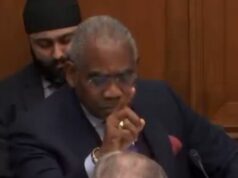Recognizing the deep corruption and cartel influence inside Mexico’s government, President Trump has pressured Mexico not only to extradite cartel prisoners for sentencing in the U.S., but also to investigate politicians with cartel ties, and extradite them as well.
So far, Mexico has expelled 55 high-ranking cartel figures in two major transfers: 29 in February and 26 this week. Notable figures include Abigael González Valencia, a leader of Los Cuinis and brother-in-law of CJNG boss “El Mencho”; Servando “La Tuta” Gómez, former head of the Knights Templar cartel; Roberto Salazar, wanted for the 2008 murder of a Los Angeles sheriff’s deputy; and Rafael Caro Quintero, implicated in the 1985 murder of a U.S. DEA agent. Others have ties to the Sinaloa Cartel, CJNG, and other violent groups.
The Trump administration has designated CJNG, Sinaloa, MS-13, and six other cartels as foreign terrorist organizations, with Attorney General Pam Bondi pledging severe consequences for those extradited. Mexico’s Security Minister Omar García Harfuch said the transfers were meant to stop cartel bosses from running operations from prison.
The extraditions took place against the backdrop of Trump’s tariff threats, which he suspended for 90 days after opening negotiations with President Claudia Sheinbaum. While Sheinbaum has cooperated on security, she insists the decisions are sovereign and rejects any prospect of U.S. military intervention. Mexican officials maintain the transfers are unrelated to trade talks, yet Trump’s strategy is clearly yielding results.
According to sources, Secretary of State Marco Rubio repeatedly pressed Mexico to investigate politicians suspected of cartel ties, warning that tariffs could return if it failed to act. Among the names raised was Baja California Governor Marina del Pilar Ávila, a member of Sheinbaum’s Morena party.
In May 2025, the U.S. government revoked Ávila’s tourist visa along with that of her husband, Carlos Torres Torres. The governor announced the decision on social media, calling it “an administrative decision, not an accusation,” and emphasizing that “there is no crime, there is no offense.” The U.S. Embassy declined to provide reasons, citing confidentiality of visa records.
At the same time, investigative outlet Semanario Zeta reported that Torres and his brother, Luis Alfonso Torres Torres, were under investigation for fuel theft and trafficking (“huachicol”), allegedly involving stolen fuel smuggled from Texas into Mexico. Luis Torres previously served as administrator of the Tijuana customs office under President Felipe Calderón. During his tenure, allegations surfaced that millions of dollars were funneled through customs to Joaquín “El Chapo” Guzmán.
Adding to the controversy, a 2019 photograph resurfaced showing Governor Ávila embracing Emmanuel “El Botas” Serrano, an alleged operative of Ismael “El Mayo” Zambada of the Sinaloa Cartel, during her mayoral campaign in Mexicali. Her office dismissed the image as meaningless, stating that “hundreds of people approach to take a photo” during campaigns.
The visa cancellation of a sitting Mexican governor marked an unprecedented diplomatic rift. Analysts note it reflects a broader Trump administration policy of imposing travel restrictions on Mexican politicians suspected of “drug corruption.”
Oscar El Blue Ramirez, a journalist and immigration correspondent specializing in Mexican cartels, said recent investigations into cartel activities have only advanced because of pressure from President Trump.
“If it was Biden, there would be no investigation whatsoever,” Ramirez argued. Since Trump returned to office, he added, two major cross-border tunnels have been closed. These tunnels, he speculated, had been used to traffic large quantities of fentanyl, cocaine, and even “exotic extracontinental migrants” from countries such as Afghanistan, Pakistan, Yemen, and Iran. Ramirez noted that one of the sealed tunnels is now under National Guard control.
He contrasted Trump’s approach with that of President Sheinbaum, accusing her of using liberal ideology to deflect blame. According to Ramirez, Sheinbaum has framed Trump’s anti-cartel campaign as an attempt by “the white man” and the United States to invade Mexico and undermine its sovereignty.
He described this narrative as misinformation, recycled from historic grievances about U.S.-Mexico relations, and claimed it was intended to rally nationalist sentiment among young people while shielding corruption and political allies.
Ramirez also criticized the Mexican liberal press, saying it reinforced Sheinbaum’s message, and drew parallels with U.S. left-wing movements. He pointed to groups such as La Raza and Chicano activists who burn American flags while waving the Mexican flag, which he argued violates Mexico’s own constitution. Articles 54 and 288, he said, prohibit tampering with the national flag and prescribe federal prison sentences for such actions. In his view, this activism sends a distorted political message in the United States and damages Mexico’s image abroad.
According to Ramirez, conditions along the border have “significantly” improved under Trump. He described the change as dramatic, noting that both Mexican citizens near the wall and U.S. border communities feel safer. “You remember when citizens were saying, ‘Oh my God, it’s so dangerous, we cannot have a life, armed men are crossing through our homes’? Now you don’t see that,” he said.
Ramirez credited the cooperation between Mexico’s National Guard and U.S. forces for sealing open border gaps and responding swiftly to incursions. In one case, he recalled, a man trying to scale the wall was forced back after a U.S. helicopter intercepted him.
He added that cartel-related protests that once erupted regularly at the border have also declined. The strategy of dismantling cartel networks, he said, is “taking the heads off the snakes.” Still, Ramirez argued that real progress will only come by targeting corruption at the political level. “We need to eliminate the dirty politicians,” he said, emphasizing that cartel power endures through its political protection.
Each time, he explained, when Trump threatened to reinforce the border or send U.S. forces, the Mexican government responded by transferring cartel bosses. But, Ramirez warned, “now she doesn’t have any more” leaders left to hand over. For him, the next step is clear: expose and extradite corrupt politicians so that future elections can produce “real officials to represent our country.”
A crackdown on serving governors or legislators would mark a dramatic escalation of anti-cartel cooperation, but it also poses political risks for Sheinbaum, as allegations involve members of her own party. Washington has long accused Mexico of shielding politicians linked to organized crime, but constitutional protections and prosecutorial independence make such cases difficult to pursue.










